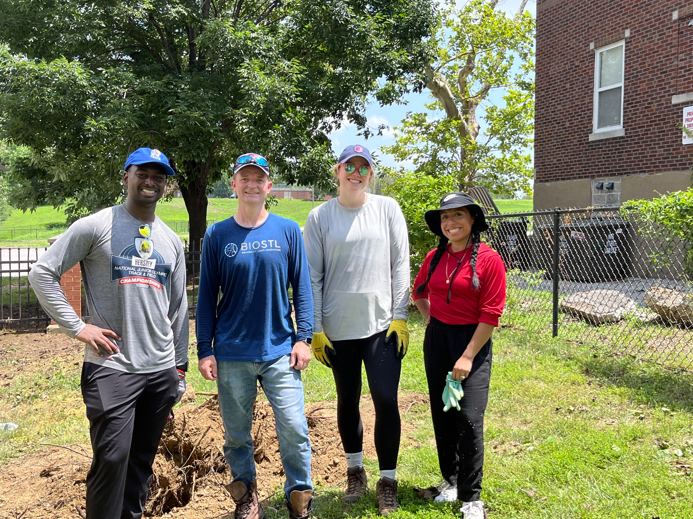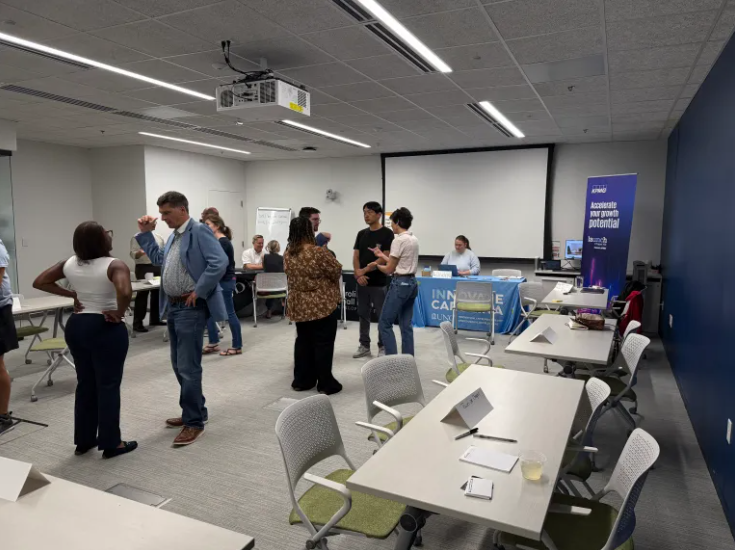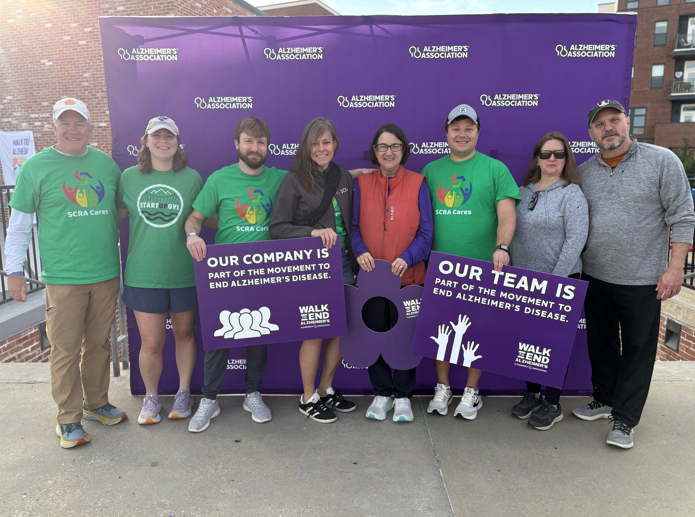Disaster relief is not directly within the purview of technology-based economic development organizations. Nonetheless, disasters frequently impact the partners and constituents of TBED organizations and exacerbate the social determinants of economic growth. Therefore, teams of people from TBED organizations frequently choose to step up and step out of their economic development sphere and engage in societal recovery from disasters.
Missouri
In May 2025, a tornado hit St. Louis, Missouri. National Public Radio reported that the winds “tore roofs off buildings, blew out windows, ripped bricks off siding and yanked up trees and power lines.” Initially, the tornado was headed straight into St. Louis’ innovation community. “But then,” said Ben Johnson, senior vice president of strategy and operations at BioSTL, “it took a sharp turn north.” In doing so, "it hit some of the most disinvested, socio-economically challenged communities in St. Louis," he said.
In the immediate aftermath of the St. Louis tornado, Johnson considered how BioSTL should respond. It did not seem BioSTL’s role to be on the ground leading, but he realized that they had many partners and collaborators who were affected. "It is a part of our mission to promote shared prosperity and inclusive growth," he said. So, they took two different approaches. One was to do what they could within their networks and sphere of influence. For example, BioSTL collaborates with the Integrated Health Network (IHN) to source innovations for community health settings. IHN shared that there was a need for refrigeration for medicine, and so BioSTL contacted their partners at MilliporeSigma, which ships scientific research products in coolers, and asked if they had any to spare. Within a matter of hours, the company dropped off pallets of coolers for people who had no electricity, allowing them to use the coolers to keep their medicine at the necessary low temperatures. "That was one example of where we can bring our access, our networks, our partners to bear in a way that fills a gap in community need,” said Johnson.
BioSTL’s second approach was to follow community leadership to first discover the community's needs, then work around those needs—rather than just showing up to volunteer in an unorganized way. They collaborated with their neighboring innovation district, the Cortex Innovation District, in partnership with the North Newstead Neighborhood Association, whose neighborhood had been significantly impacted by the tornado. That group identified areas where they needed help in the neighborhood, and then BioSTL organized its staff, volunteers, and partners to participate in the work.

BioSTL Team (L to R): Grant Downes, Ben Johnson, Courtney Shaw, Mayra Taylor Garcia
North Carolina
Two months after the tornado damaged St. Louis, tropical storm Chantal hit Chapel Hill, North Carolina. “A number of companies were displaced,” said Sheryl Waddell, director of innovation hubs and engagement at Innovate Carolina Junction (the Junction) at the University of North Carolina, Chapel Hill. Similar to BioSTL, the Junction became involved in disaster recovery efforts through its community partnerships. "I was chatting with the [Chapel Hill-Carrboro Chamber of Commerce], and they mentioned that they had people within the community that needed help," said Waddell. "And then people in the community who wanted to lend their help. And [they were] looking for ways in which to get these people connected."
Waddell noted the Junction often offers community-connecting events within the innovation community. "We have a staff of six that provides various services, both operations of the space as well as development of innovative programming," she said. “They all have the knowledge and the expertise to be able to do it, but [for this] they funneled it in a different way [by] volunteering that day and [planning] the logistics all before that day as well.”
They created a full-day open house to offer resources for businesses negatively impacted by the storm. The event provided help from legal, insurance, and banking organizations. This experience, Waddell noted, was very different from her team's usual day-to-day activities. "Typically, our support is all about the numbers, looking at how we can have the best economic impact in addition to a social impact,” she said. “But this was all about a social impact.”

Flood Relief Day at Innovate Carolina Junction
South Carolina
Meanwhile, other types of calamities are continuously chipping away at human well-being. In the U.S., over 7 million Americans are living with Alzheimer’s. More than one in five U.S. adults lives with a mental illness. And about 42,170 women will die from breast cancer in 2025. This fall the South Carolina Research Authority (SCRA) launched an initiative that tackles these societal challenges. “One of our key initiatives this year was to increase our team’s participation in volunteer and charitable activities across the state,” said Yolanda Lewis, SCRA’s HR Director. “Our employees have really embraced that goal—supporting local nonprofits, community events, and causes that make a difference. To show our shared commitment, the team even designed special ‘SCRA Cares’ shirts that we wear during volunteer activities. It’s a great reminder that giving back is part of who we are at SCRA.”
The initiative has resulted in SCRA staff participating in the Greenville Walk to End Alzheimer's in October, raising nearly $1,200 to support the fight against Alzheimer's and dementia. During the same week, SCRA's Charleston team participated in the Teacher Supply Closet, a free store for teachers. There are also plans for staff from their Charleston office to participate in a Race for Life, which promotes awareness of mental health, autism, and dementia, and for staff in their Columbia office to participate in a breast cancer walk.
This SCRA initiative allows staff to experience the support of their coworkers as they engage in volunteer activities that are meaningful to them. Rob Moser, senior investment manager at SCRA, who organized their team's involvement in the Walk to End Alzheimer’s, noted, "For me, the cause is very personal as my mother and my mother-in-law both died of Alzheimer's and dementia within the past two years. … I am extremely grateful that the SCRA family was willing and eager to participate in the walk."
William “Bill” Kirkland, SCRA Interim president and CEO said, "Our team understands the importance of being part of the community that you serve. I'm proud of them and proud and humbled to lead them."

The Upstate SCRA team and their families who participated in Greenville Walk to End Alzheimer’s (L to R) Rob Moser (SCRA), Riley Johnson, Clay Johnson, Jeannine Rogers (SCRA), Avery Moser, Patrick Bailey (SCRA), Pam Bell, Matt Bell (SCRA).